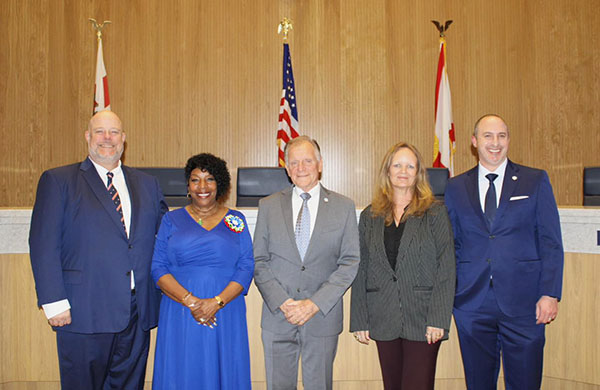
The Royal Palm Beach Village Council held its first ever “special session” Thursday, May 8 to deal with the topic of education and how the village should interact with local schools. Except for meetings dealing with the budget, it was the first special session of the council in more than 20 years.
At the workshop, the questions before the council centered on whether, how, and how much resources and funding that the village should expend in an effort to improve the ratings and reputations of village schools.
Mayor Jeff Hmara, who initiated the meeting, summed up the complicated issue this way: “Good schools equal good community.”
While the Palm Beach County School Board has primary responsibility for educating students, good schools tend to enhance property values, and so the consensus on the council is that local government has a vested interest in educational outcomes.
Village Manager Ray Liggins briefed the council on the village’s present spending and level of engagement with schools. The village currently awards 10 scholarships annually of $1,000 each. Another $1,000 annually is set aside to help five local schools celebrate Arbor Day.
In addition, the village allows access to its recreational facilities, such as ball fields, under shared facility use agreements. The village also operates an Education Advisory Board (EAB), which meets monthly during the school year, and hears presentations regularly from all local schools.
Liggins then went on to describe how other local governments deal with education issues.
In addition to giving out $400,000 in direct grants to local schools annually, the Village of Wellington has a youth council, an Education Committee, a tutoring program, and a variety of other educational programs, such as bringing Civics 101 into middle and high schools.
Palm Beach Gardens donates about $5,000 a year to local schools, South Bay offers $10,000 in scholarships annually, while Lantana holds School Advisory Council meetings. Greenacres shares the Royal Palm Beach model and has an Education Advisory Committee while giving out about $15,000 a year in scholarships.
Each council member was invited to give their thoughts on the path that the village should take.
Councilwoman Sylvia Sharps asked for stronger engagement with school principals but said she feels comfortable with the village’s present level of spending on education. “My goal is to add more youth to our EAB,” she said.
Vice Mayor Richard Valuntas sees the benefit of more involvement. “We have to get involved,” he said. “We have a vested interest in education.”
Two ideas that appeal to him are a tutoring program and finding ways to recognize good teachers.
Councilman Adam Miller, an education professional with a related doctoral degree, emphasized the need to retain good teachers, perhaps through a teacher of the month award program. He also floated the idea of getting the local business community more involved.
“What if businesses gave out teacher discounts,” he suggested. “Maybe the village could compile a list of teacher-friendly businesses.”
He also pointed to the idea of auctioning out a “mayor for the day” program. Palm Beach Gardens has raised about $24,000 for education this way.
Councilwoman Jan Rodusky is looking for the most bang for the buck.
“I am all about prioritizing and prefer lower-cost programs with an emphasis on measurable outcomes and parental involvement,” she said.
Hmara said he wants the village to advocate for and celebrate schools and education. He mentioned internships, the success of career days, civics education and a youth council.
“About 40 percent of Royal Palm Beach students attend magnet schools outside the village,” Hmara said. “We need our magnets to be stronger than their magnets.”
He also noted how the village might do a better job celebrating school achievements as one way to combat negative perceptions of village schools.
Hmara then described his plans to turn the EAB into an enhanced version “EAB 3.0.”
“We have a strong and capable EAB that we can even better engage,” he said.
Possible differences may include adding oversight of a youth council, coordinating Florida City Government Week activities and internships, and considering a teacher recognition initiative, perhaps as part of each school’s EAB showcase meeting.
The meeting concluded with the council directing village staff to investigate the resources needed to have a youth council program and a Florida City Government Week, as outlined by the Florida League of Cities. They also asked to explore working with the schools to create a civics education program, career day and internships.







